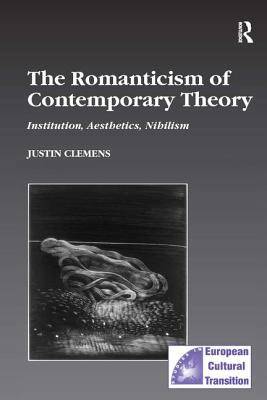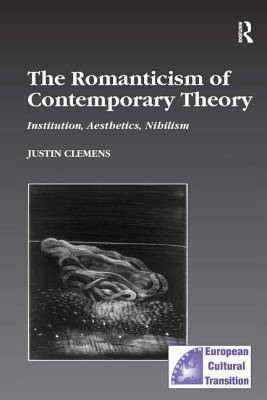
- Afhalen na 1 uur in een winkel met voorraad
- Gratis thuislevering in België vanaf € 30
- Ruim aanbod met 7 miljoen producten
- Afhalen na 1 uur in een winkel met voorraad
- Gratis thuislevering in België vanaf € 30
- Ruim aanbod met 7 miljoen producten
Zoeken
€ 195,95
+ 391 punten
Omschrijving
Using Phillipe Lacoue-Labarthe and Jean-Luc Nancy's groundbreaking study of the persistence of German Idealist philosophy as his starting point, Justin Clemens presents a valuable study of the links between Romanticism and contemporary theory. The central contention of this book is that contemporary theory is still essentially Romantic - despite all its declarations to the contrary, and despite all its attempts to elude or exceed the limits bequeathed it by Romantic thought. The argument focuses on the ruses of 'Romanticism's indefinable character' under two main rubrics, 'Contexts' and 'Interventions'. The first three chapters investigate 'Contexts', examining some of the broad trends in the historical and institutional development of Romantic criticism; the second section, 'Interventions', comprises close readings of the work of Jacques Lacan, Gilles Deleuze and Félix Guattari, Eve Kosofsky Sedgwick, Ian Hunter and Alain Badiou. In the first chapter Clemens identifies and traces the development of two interlocking recurrent themes in Romantic criticism: the Romantic desire to escape Romanticism, and the problem posed to aesthetico-philosophical thought by the modern domiciliation of philosophy in the university. He develops these themes in the second chapter by examining the link forged between aesthetics and the subject in the work of Immanuel Kant. In the third chapter, Clemens shows how the Romantic problems of the academic institution and aesthetics were effectively bound together by the philosophical diagnosis of nihilism. Chapter Four focuses on two key moments in the work of Jacques Lacan - his theory of the 'mirror stage' and his 'formulas of sexuation' - and demonstrates how Lacan returns to the grounding claims of Kantian aesthetics in such a way as to render him complicit with the Romantic thought he often seems to contest. In the following chapter, taking Deleuze and Guattari's notion of 'multiplicity' as a guiding thread, Clemens links their account to their professed 'anti-Platonism', showing how they find themselves forced back onto emblematically Romantic arguments. Chapter Six provides a close reading of Sedgwick's most influential text, Epistemology of the Closet. Clemens' reading localizes her practice both in the newly consolidated academic field of 'Queer Theory' and in a conceptual genealogy whose roots can be traced back to a particular anti-Enlightenment strain of Romanticism. Clemens next turns to the professedly anti-Romantic arguments of Ian Hunter, a major figure in the ongoing re-writing of modern histories of education. In the final chapter he examines the work of the contemporary French philosopher Alain Badiou. Clemens argues that, if Badiou's hostility to the diagnosis of nihilism, his return to Plato and mathematics, and his expulsion of poetry from philosophical method, all place him at a genuine distance from dominant Romantic trends, even this attempt admits ciphered Romantic elements. This study will be of interest to literary theorists, philosophers, political theorists, and cultural studies scholars.
Specificaties
Betrokkenen
- Auteur(s):
- Uitgeverij:
Inhoud
- Aantal bladzijden:
- 240
- Taal:
- Engels
- Reeks:
- Reeksnummer:
- nr. 17
Eigenschappen
- Productcode (EAN):
- 9780754608752
- Verschijningsdatum:
- 11/08/2003
- Uitvoering:
- Hardcover
- Formaat:
- Genaaid
- Afmetingen:
- 156 mm x 234 mm
- Gewicht:
- 503 g

Alleen bij Standaard Boekhandel
+ 391 punten op je klantenkaart van Standaard Boekhandel
Beoordelingen
We publiceren alleen reviews die voldoen aan de voorwaarden voor reviews. Bekijk onze voorwaarden voor reviews.











